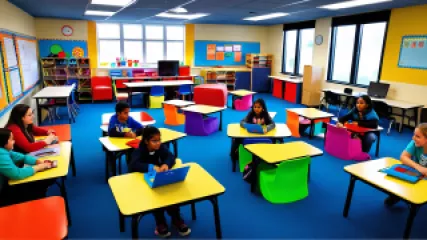What are the Top Tips for Special Education Professionals?
What are the Top Tips for Special Education Professionals?
As a special education professional, you play a crucial role in shaping the lives of students with diverse learning needs. Whether you're a teacher, paraprofessional, or administrator, your dedication and expertise can make all the difference in providing quality education and support. In this article, we'll explore the top tips that can help special education professionals excel in their field and positively impact the lives of the students they serve.
1. Embrace Individualized Instruction
One of the hallmarks of effective special education is the ability to tailor instruction to the unique needs of each student. Every child is different, with their own strengths, challenges, and learning styles. As a special education professional, it's essential to understand and accommodate these individual differences. This may involve using a variety of teaching methods, adapting lesson plans, and collaborating closely with students, parents, and other team members to ensure each child receives the support they need to succeed.
2. Foster Positive Relationships
Building strong, positive relationships with your students is crucial for their academic and social-emotional growth. When students feel valued, understood, and supported, they are more likely to engage actively in the learning process and develop the confidence to overcome challenges. Take the time to get to know your students, learn about their interests and experiences, and create an environment where they feel safe, respected, and empowered.
3. Collaborate Effectively
Special education is a team effort, and effective collaboration is essential for providing the best possible support for students. Work closely with general education teachers, related service providers (such as speech therapists, occupational therapists, and psychologists), administrators, and parents to coordinate strategies, share information, and ensure a cohesive approach to the student's education and well-being. Regular communication, joint problem-solving, and a shared commitment to the student's success can make a significant difference in their academic and personal growth.
4. Utilize Evidence-Based Practices
As a special education professional, it's crucial to stay up-to-date with the latest research and evidence-based practices in the field. This includes incorporating teaching methods, interventions, and technologies that have been proven effective in supporting students with diverse learning needs. Continuously seek out professional development opportunities, attend conferences, and engage in ongoing learning to enhance your knowledge and skills. By staying informed and implementing evidence-based practices, you can ensure that your students receive the most effective and impactful instruction.
5. Advocate for Your Students
Special education professionals are often the strongest advocates for their students, ensuring that their unique needs are recognized and that they receive the support and accommodations they require. This may involve navigating the complex landscape of Individualized Education Programs (IEPs), advocating for appropriate placements, securing necessary resources, and ensuring that your students' rights are protected. Be a tireless champion for your students, empowering them to reach their full potential and advocating for the resources and services they need to succeed.
6. Promote Inclusion and Equity
Inclusive education is a fundamental principle of special education, and as a professional, you play a vital role in fostering an inclusive and equitable learning environment. This means working to break down barriers, challenge biases, and create opportunities for students with diverse learning needs to participate fully in the general education curriculum and school community. Collaborate with your colleagues to implement inclusive practices, adapt instructional methods, and promote a culture of acceptance and respect for all students.
7. Prioritize Social-Emotional Learning
In addition to academic progress, the social-emotional well-being of your students is equally important. Many students with special needs face unique social and emotional challenges, and as a special education professional, you can help them develop the skills and strategies to navigate these challenges successfully. Incorporate social-emotional learning (SEL) into your instructional practices, teach self-regulation and coping strategies, and create opportunities for students to build social skills and form meaningful connections with their peers.
8. Embrace Continuous Learning and Growth
The field of special education is constantly evolving, and as a professional, it's essential to maintain a growth mindset and a commitment to continuous learning. Engage in ongoing professional development, seek out mentorship opportunities, and stay informed about the latest research, policies, and best practices in the field. By continuously expanding your knowledge and skills, you can ensure that your students benefit from the most up-to-date and effective instructional approaches.
9. Practice Self-Care and Resilience
The work of a special education professional can be both rewarding and demanding. It's crucial to prioritize your own well-being and build resilience to avoid burnout and maintain your effectiveness in supporting your students. Engage in self-care practices, such as mindfulness, exercise, and time management strategies, to manage stress and maintain a healthy work-life balance. Surround yourself with a supportive network of colleagues, seek out mentorship and supervision, and celebrate your successes to maintain a positive outlook and a sense of purpose in your work.
10. Celebrate Successes and Milestones
The journey of a special education student can be filled with both challenges and triumphs. As a professional, it's important to recognize and celebrate the progress and achievements of your students, no matter how small. This not only boosts their confidence and motivation but also reinforces the impact of your work. Take the time to acknowledge your students' hard work, celebrate their accomplishments, and share these successes with their families and the wider school community. These moments of celebration can be powerful catalysts for continued growth and success.
In conclusion, being a special education professional is a rewarding and impactful calling. By embracing these top tips – from individualizing instruction and fostering positive relationships to advocating for your students and prioritizing self-care – you can empower your students, enrich your practice, and make a lasting difference in the lives of the individuals you serve. Remember, every child is unique, and with your dedication, expertise, and unwavering support, you can help them unlock their full potential and thrive in the classroom and beyond.






